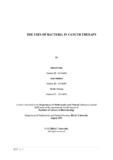| dc.contributor.advisor | Haque, Fahim Kabir Monjurul | |
| dc.contributor.author | Saha, Shimul | |
| dc.contributor.author | Mollick, Simi | |
| dc.contributor.author | Zaman, Shaila | |
| dc.date.accessioned | 2021-10-26T05:46:41Z | |
| dc.date.available | 2021-10-26T05:46:41Z | |
| dc.date.copyright | 2021. | |
| dc.date.issued | 2021-08 | |
| dc.identifier.other | ID: 15236006 | |
| dc.identifier.other | ID: 15336002 | |
| dc.identifier.other | ID: 15336013 | |
| dc.identifier.uri | http://hdl.handle.net/10361/15546 | |
| dc.description | This thesis is submitted in partial fulfillment of the requirements for the degree of Bachelor of Science in Biotechnology 2021. | en_US |
| dc.description | Catalogued from PDF version of thesis. | |
| dc.description | Includes bibliographical references (pages 51-74). | |
| dc.description.abstract | Cancer is one of the leading cause of death worldwide. Cancer treatment success remains a challenge due to the unique pathophysiology of solid tumors and the predictable emergence of drug resistance. Traditional cancer treatments, including radiation therapy, chemotherapy, and immunotherapy, have limitations. A new approach, bacteriotherapy, used alone or in combination with traditional methods, has shown positive effects in regression of tumors and inhibition of metastases. Bacteriotherapy is the use of live, attenuated strains of bacteria, toxins, peptides, and bacteriocins in the treatment of cancer. They're also commonly employed as a vector for delivering genes, peptides, or medicines to tumor targets. Surprisingly, it was shown that combining them with traditional therapy techniques can improve outcomes. In the era of genome editing, it is possible to create a new generation of cancer-fighting bacteria with fewer side effects and higher efficacy. The goal of this paper was to summarize what is currently known about bacteria's involvement in cancer treatment. Here, we reviewed the recent improvements in the development of engineered bacteria for cancer therapy, as well as further engineering techniques to enhance the delivery of therapeutic payloads and recent advances in the field of Salmonella typhimurium (S. typhimurium) and Escherichia coli (E. coli) mediated cancer therapy. Finally, we discuss past and ongoing clinical studies involving tumor-targeting bacteria. | en_US |
| dc.description.statementofresponsibility | Shimul Saha | |
| dc.description.statementofresponsibility | Simi Mollick | |
| dc.description.statementofresponsibility | Shaila Zaman | |
| dc.format.extent | 74 Pages | |
| dc.language.iso | en_US | en_US |
| dc.publisher | Brac University | en_US |
| dc.rights | Brac University theses are protected by copyright. They may be viewed from this source for any purpose, but reproduction or distribution in any format is prohibited without written permission. | |
| dc.subject | Bacteriocin | en_US |
| dc.subject | Bacterila Toxin | en_US |
| dc.subject | Bacterial Peptides | en_US |
| dc.subject | Bacterial Vector | en_US |
| dc.subject | Enzymes | en_US |
| dc.subject | Bacterial Ghost | en_US |
| dc.subject | Immunotherapy | en_US |
| dc.subject | Cytotoxin Protein Melanoma | en_US |
| dc.subject | Colon Cancer | en_US |
| dc.subject | Gastrointestinal Cancer | en_US |
| dc.subject | Lung Cancer | en_US |
| dc.subject | Gastrointestinal Microbiota | en_US |
| dc.subject | Mycobacterium Bovis | en_US |
| dc.subject | Salmonella Typhimurium | en_US |
| dc.subject | E.Coli | en_US |
| dc.subject | Magnetococcus Marinus | en_US |
| dc.subject | Clostridium | en_US |
| dc.subject | Lactic Acid Bacteria | en_US |
| dc.title | The uses of bacteria in cancer therapy | en_US |
| dc.type | Thesis | en_US |
| dc.contributor.department | Department of Mathematics and Natural Sciences, Brac University | |
| dc.description.degree | B. Biotechnology | |

